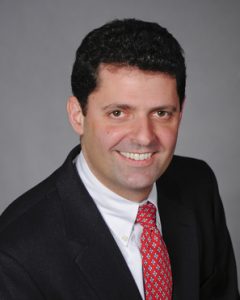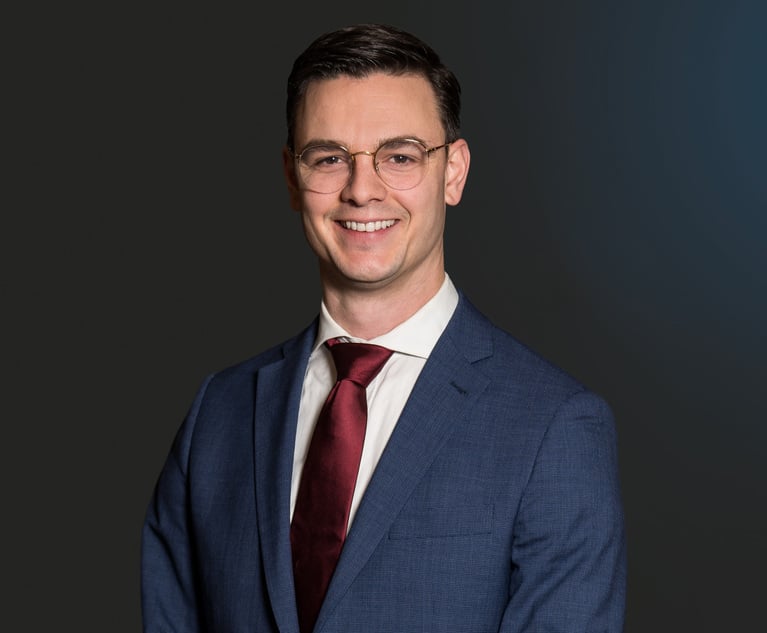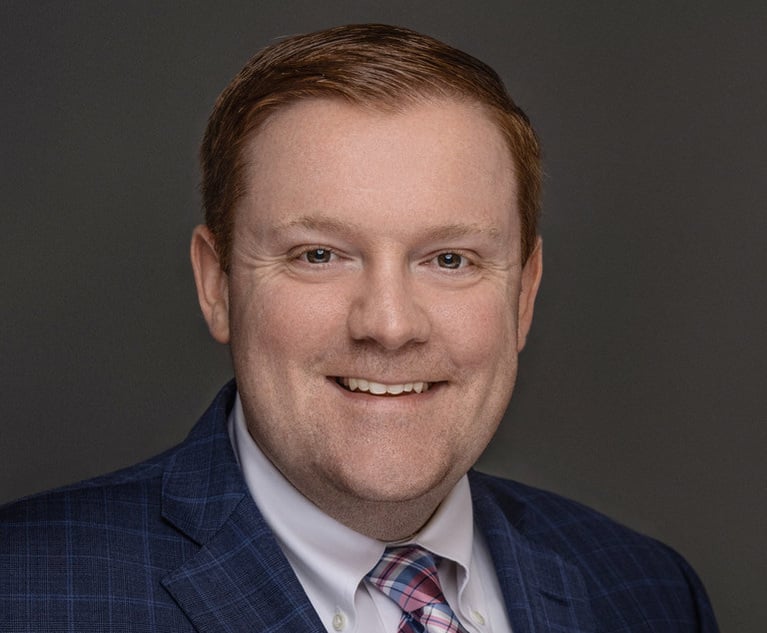Obermayer Rebmann: Using Tighter Relationships to Take On the Next 114 Years
"Not only can we more cost-effectively do the same work, but companies have begun to realize our value beyond our lower prices," managing partner Mathieu Shapiro said.
October 09, 2018 at 04:37 PM
5 minute read
 Mathieu Shapiro.
Mathieu Shapiro.
Firm Name: Obermayer Rebmann Maxwell & Hippel.
Firm Leader: Mathieu J. Shapiro, managing partner.
Head Count: 116 attorneys.
Locations: Philadelphia; Pittsburgh; Conshohocken, Pennsylvania; Doylestown, Pennsylvania; Harrisburg, Pennsylvania; Hartford, Connecticut; New York; Cherry Hill, New Jersey; Wilmington, Delaware.
Practice Areas: Full-service.
Governance structure and compensation model: Partnership structure; formulaic and open compensation model.
Do you offer alternative fee arrangements? Yes.
**Shapiro provided answers to the questions below. They have been edited lightly for style.**
What do you view as the two biggest opportunities for your firm, and what are the two biggest threats?
Opportunities:
- Our geographic expansion is enabling us to leverage and expand our historically strong Philadelphia-based connections throughout the mid-Atlantic region.
- Our efficient staffing allows us to handle high-end/complex matters more cost-effectively and predictably.
Threats:
- Although our rates are significantly lower than many large firms, we nonetheless make every effort to invest in cutting-edge technology and keep up with large firms. This creates pressure on us which is not felt by other firms.
- We do not have the reach of national or international firms, though we hope our knowledge and industry experience in our specific region, and our affiliation with Ally Law, balances this lack of reach.
The legal market is so competitive now—what trends do you see, and has anything, including alternative service providers, altered your approach? Is your chief competition other mid-market firms, or is your firm competing against big firms for the same work?
One trend we have both noticed and experienced first-hand is that larger companies are forgoing their Big Law go-tos, and have instead been gravitating more toward midsize firms for their legal work. Not only can we more cost-effectively do the same work, but companies have begun to realize our value beyond our lower prices. For one, we develop more authentic and long-lasting relationships with our clients. This not only helps instill their earned trust, but helps us know their businesses inside and out, which in turn helps us better serve them in the end. Against this backdrop, we would be remiss not to compete against big firms for the same work.
Another trend that has altered our approach to client service is the growing importance of industry practice teams. We understand how our corporate clients value legal teams that know their industry and, as such, are in the process of restructuring our linear practice groups into interdisciplinary industry teams.
There is much debate around how law firms can foster the next generation of legal talent. What advantages and disadvantages do midsize firms have in attracting and retaining young lawyers, particularly millennials?
We offer more work-life balance. Due to our relatively smaller size, midsize firms do offer more opportunities for associates to cultivate organic mentor-mentee relationships, and with that, more opportunities for feedback and to work on sophisticated legal matters much earlier in their careers.
Does your firm employ any nonlawyer professionals in high-level positions (e.g. COO, business development officer, chief strategy officer, etc.)? If so, why is it advantageous to have a nonlawyer in that role? If not, have you considered hiring any?
We do employ nonlawyers in high-level positions (i.e., our chief operating officer has a finance background, and our first chief marketing officer had a business background). This diversity serves our organization well due to the wide array of skill sets and perspectives that ultimately shape our firm's strategy. It also allows our attorneys to focus on what they do best: lawyering.
What would you say is the most innovative thing your firm has done recently, whether it be technology advancements, internal operations, how you work with clients, etc.?
We recently revamped our conflicts system, to take advantage of new technologies and account for the ever-expanding reach of our client base.
Does your firm have a succession plan in place? If so, what challenges do you face in trying to execute that plan? If you don't currently have a plan, is it an issue your firm is thinking about?
Several years ago, we went through an extensive long-range planning process, out which we transitioned to our first new managing partner in over 30 years, and appointed a new vice chair of the firm. Our seven-person management committee now has a majority of members in the “next” generation of firm leaders. We have also successfully transitioned the heads of several departments. We intend to continue thinking actively about succession to ensure the firm continues to be relevant and is still standing for another 114 years.
This content has been archived. It is available through our partners, LexisNexis® and Bloomberg Law.
To view this content, please continue to their sites.
Not a Lexis Subscriber?
Subscribe Now
Not a Bloomberg Law Subscriber?
Subscribe Now
NOT FOR REPRINT
© 2025 ALM Global, LLC, All Rights Reserved. Request academic re-use from www.copyright.com. All other uses, submit a request to [email protected]. For more information visit Asset & Logo Licensing.
You Might Like
View All
Visa Revocation and Removal: Can the New Administration Remove Foreign Nationals for Past Advocacy?
6 minute read
Saul Ewing Loses Two Partners to Fox Rothschild, Marking Four Fla. Partner Exits in Last 13 Months
3 minute read
Trending Stories
- 1ACC CLO Survey Waves Warning Flags for Boards
- 2States Accuse Trump of Thwarting Court's Funding Restoration Order
- 3Microsoft Becomes Latest Tech Company to Face Claims of Stealing Marketing Commissions From Influencers
- 4Coral Gables Attorney Busted for Stalking Lawyer
- 5Trump's DOJ Delays Releasing Jan. 6 FBI Agents List Under Consent Order
Who Got The Work
J. Brugh Lower of Gibbons has entered an appearance for industrial equipment supplier Devco Corporation in a pending trademark infringement lawsuit. The suit, accusing the defendant of selling knock-off Graco products, was filed Dec. 18 in New Jersey District Court by Rivkin Radler on behalf of Graco Inc. and Graco Minnesota. The case, assigned to U.S. District Judge Zahid N. Quraishi, is 3:24-cv-11294, Graco Inc. et al v. Devco Corporation.
Who Got The Work
Rebecca Maller-Stein and Kent A. Yalowitz of Arnold & Porter Kaye Scholer have entered their appearances for Hanaco Venture Capital and its executives, Lior Prosor and David Frankel, in a pending securities lawsuit. The action, filed on Dec. 24 in New York Southern District Court by Zell, Aron & Co. on behalf of Goldeneye Advisors, accuses the defendants of negligently and fraudulently managing the plaintiff's $1 million investment. The case, assigned to U.S. District Judge Vernon S. Broderick, is 1:24-cv-09918, Goldeneye Advisors, LLC v. Hanaco Venture Capital, Ltd. et al.
Who Got The Work
Attorneys from A&O Shearman has stepped in as defense counsel for Toronto-Dominion Bank and other defendants in a pending securities class action. The suit, filed Dec. 11 in New York Southern District Court by Bleichmar Fonti & Auld, accuses the defendants of concealing the bank's 'pervasive' deficiencies in regards to its compliance with the Bank Secrecy Act and the quality of its anti-money laundering controls. The case, assigned to U.S. District Judge Arun Subramanian, is 1:24-cv-09445, Gonzalez v. The Toronto-Dominion Bank et al.
Who Got The Work
Crown Castle International, a Pennsylvania company providing shared communications infrastructure, has turned to Luke D. Wolf of Gordon Rees Scully Mansukhani to fend off a pending breach-of-contract lawsuit. The court action, filed Nov. 25 in Michigan Eastern District Court by Hooper Hathaway PC on behalf of The Town Residences LLC, accuses Crown Castle of failing to transfer approximately $30,000 in utility payments from T-Mobile in breach of a roof-top lease and assignment agreement. The case, assigned to U.S. District Judge Susan K. Declercq, is 2:24-cv-13131, The Town Residences LLC v. T-Mobile US, Inc. et al.
Who Got The Work
Wilfred P. Coronato and Daniel M. Schwartz of McCarter & English have stepped in as defense counsel to Electrolux Home Products Inc. in a pending product liability lawsuit. The court action, filed Nov. 26 in New York Eastern District Court by Poulos Lopiccolo PC and Nagel Rice LLP on behalf of David Stern, alleges that the defendant's refrigerators’ drawers and shelving repeatedly break and fall apart within months after purchase. The case, assigned to U.S. District Judge Joan M. Azrack, is 2:24-cv-08204, Stern v. Electrolux Home Products, Inc.
Featured Firms
Law Offices of Gary Martin Hays & Associates, P.C.
(470) 294-1674
Law Offices of Mark E. Salomone
(857) 444-6468
Smith & Hassler
(713) 739-1250






